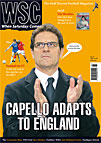 Relegation to the Conference could spell the end for Mansfield or Wrexham largely thanks to their destructive chairmen
Relegation to the Conference could spell the end for Mansfield or Wrexham largely thanks to their destructive chairmen
It has been a while since relegation to the Conference was tantamount to dropping into a black hole. In the past ten years, seven clubs have been promoted back into the League after falling out. That won’t be any consolation to fans of Mansfield Town and Wrexham, who remain stuck at the foot of League Two with games running out fast.
Neither has had a history of struggling at the foot of the Football League. In the last 50 years the lowest Mansfield have finished was fifth from bottom twice, the last time in 1981-82. Wrexham were in relegation trouble last season until propelled clear with four wins in the last five games, but they hadn’t finished in the bottom four in this division since 1990-91. Like Carlisle and Doncaster, both now thriving near the top of League One a few years after a tumble into the Conference, Mansfield and Wrexham can blame their predicament on having been gradually run down by troublesome owners.
For years Wrexham fan groups fought a rearguard action against former chairman Alex Hamilton, who attempted to make the club vacate the Racecourse Ground so that he could sell it for redevelopment. This led, in December 2004, to their being the first club to be fined ten points for going into administration; the threat from Hamilton lingered on until current chairman Neville Dickens acquired control in May 2006.
Mansfield fans have striven to rid themselves of owner Keith Haslam for a long time. Team Mansfield, the supporters’ trust, was set up as long ago as 1999 with the aim of taking over the club and opposition has hardened as the team slipped down the League; manager Billy Dearden was sacked recently after complaining that money from the club’s FA Cup run had not been made available to strengthen the struggling side. Haslam’s 14-year reign seemed set to end with a takeover by James Derry, the club’s non-executive chairman, which had been cautiously welcomed. But Derry withdrew at the end of March after failing to secure the necessary funds.
The club are now considering a bid from a former member of the Derry consortium who has already made alarming public statements. This is John Batchelor, a motor-sports entrepreneur who was briefly in control of York City in 2002-03, when he adapted the club badge to incorporate a chequered flag and changed their official name to York City Soccer Club “to generate interest from America”. Batchelor was finally prised out a year later by a supporters’ trust, having reneged on various promises made during his takeover including that he would buy the ground and bring fan representatives on to the board.
His attitude towards Mansfield was spelt out in stark terms in a local radio interview on the day before a goalless draw at Notts County that left the club seven points adrift. “If I am successful in achieving ownership, this will be my club, my business and up to me to provide entertainment. I am not even interested in discussing it with ‘fans’, however I will talk to customers any time.”
By far the strangest of Batchelor’s various ideas for boosting interest is to change Mansfield’s name to Harchester United, which will supposedly attract interest from fans of Sky’s Dream Team series: “One club has been on the television for ten years and the other one hasn’t.” After an outcry, Batchelor has already backtracked, saying that “if the stadium is full every week maybe there would be no need to rename the club”. With his blustering self‑aggrandisement, Batchelor might seem like a parody of a football club owner – the type of figure indeed who could plausibly appear in Dream Team – but no one in Mansfield will see the joke.
People like Hamilton and Batchelor keep surfacing in football, taking clubs to the brink of extinction, whether through methodical asset-stripping or sheer incompetence or a mixture of the two. The “fit and proper person” test doesn’t appear to weed them out and when clubs are in financial crisis, with a shortage of suitors, it is difficult for the game’s authorities to block them.
When clubs are heavily indebted (especially when they have lost control of their ground), the fans Batchelor derides are the one true asset left. They cannot be sold or repossessed by the bank or seized by Her Majesty’s Revenue & Customs. Supporters’ trusts cannot solve every problem – as Bournemouth’s experience has shown – but their presence can prove a focal point for those the game needs and should value. Unlike Batchelor, fans are not just there for what they can get out of football, but for what they can put into it.
From WSC 255 May 2008